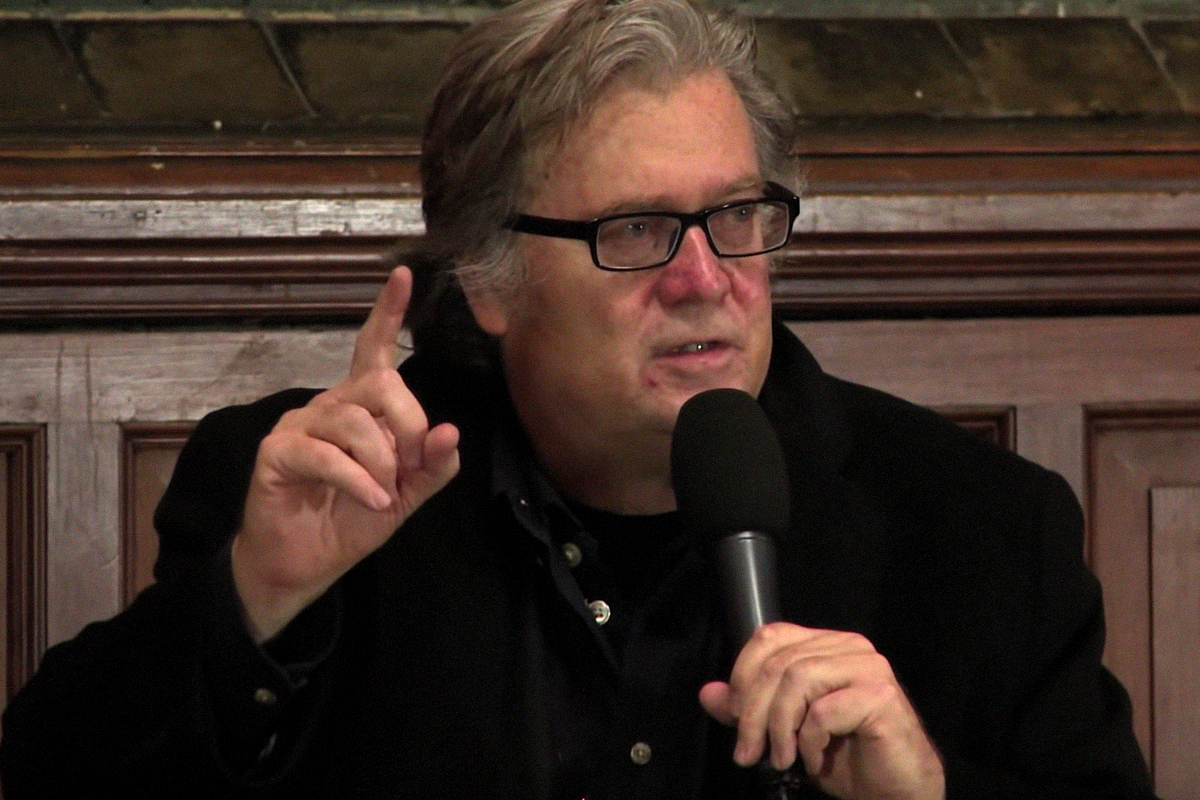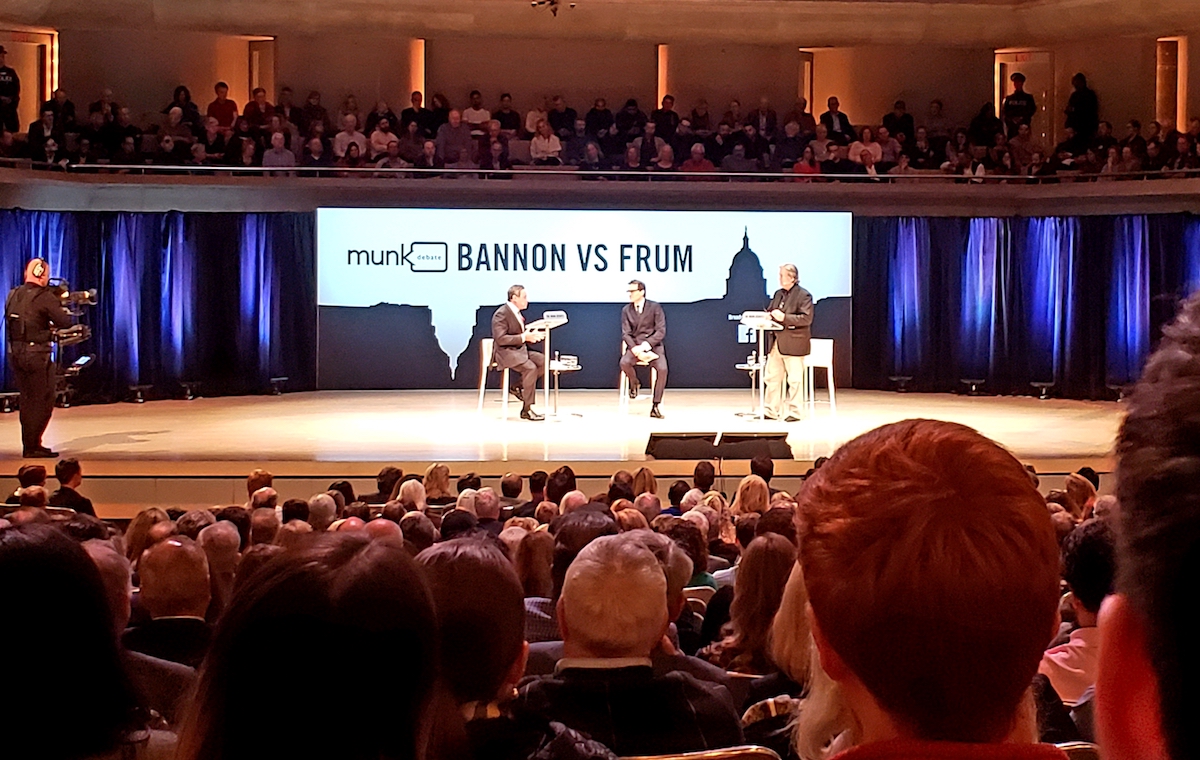recent
Steve Bannon Is Wrong, But Not for the Reasons You Think
This trollishness was amplified by a refusal to acknowledge the unprecedented nature of our current political polarization, and the social ills that flow from it.

If you consume prestige media, then it is likely that you believe a number of things about Steve Bannon on faith. For instance, you might believe that Steve Bannon is a white nationalist and an Islamophobe. And you may well believe that he’s a fascist—perhaps even a Nazi.
Each of these propositions has been logged repeatedly in influential outlets, and each has self-replicated its way into received wisdom, greeted by little more than eager nodding if said aloud at a book launch party. Zack Beauchamp at Vox called Bannon “a leading light of America’s white nationalist movement.” Omer Aziz in the New Republic said that Bannon believes “a war between the West and the Muslims is inevitable.” Kira Lerner at ThinkProgress reported that Bannon “direct[ed] white supremacist and Nazi beliefs into the mainstream.”
So naturally, when the Oxford Union announced that it would be hosting Bannon for a speaking event on November 16, they were accused of “legitimizing racism and fascism” by hosting a man who was “build[ing] an Islamophobic international” and served as “the white supremacists’ link to the White House.” The only problem is that Bannon’s speech credibly refuted each of these charges, exposing a rather large gap between Bannon’s actual views and the views much of the media attributes to him.
Media Bannon is a white nationalist. But Oxford Bannon said that “ethno-nationalism is a dead-end, and it’s for losers…economic and civic nationalisms bind you together, as citizens, regardless of your race, regardless of your ethnicity.” He described his “life’s work” as a political realignment that would attract “a third to 40 percent of the African-American, Hispanic, and Asian working class and middle class.” He elaborated that he wants “more people voting, I want this voter suppression stuff to go away because working class African-Americans are going to be one of the core planks of our movement.”
Media Bannon is an Islamophobe. Oxford Bannon noted that, when he was a part of the Trump administration, “we went to Riyadh before Jerusalem, and before Rome, to send a message to the Islamic community: we are there for you and we’re your allies.” Media Bannon is a fascist. Oxford Bannon argued that “fascism is the worship of the state…it’s the combination of state crony capitalism and big government. It’s exactly what we’re trying to fight.”
Bannon’s Oxford interlocutors challenged his defenses by doubling down, hoping that if their guest was plied with Trump quotes about Mexicans, Media Bannon would appear. He did not. When the moderator asked Bannon to defend Trump’s “rhetoric about immigrants being rapists and terrorists,” Oxford Bannon emerged to talk immigration policy and grand strategy. Not getting what he’d hoped for, the moderator tried again, demanding that Bannon answer for “comments about Mexicans being rapists.” Bannon rolled his eyes. “Are we going to do this now for a third time? We can do this all night. Yes, [Trump’s] language is sometimes a little hot.” The trouble is that Bannon wanted to discuss ideas, but his audience could only understand him as a caricature. When Oxford Bannon arrived, the audience decided to instead debate a Media Bannon who wasn’t actually there. They weren’t having the same conversation.

Bannon confounds the Left because his economic populism turns out to be pretty progressive—if you’re a Bernie Sanders fan, Bannon seems to “get it.” But that can’t be right—Media Bannon couldn’t possibly be worth listening to. So, when Bannon opens his Oxford speech by lamenting that none of the bankers that caused the Great Recession were prosecuted, and explains how he fought for increasing the tax rate on top earners to 44 percent, and expresses outrage that the middle class hasn’t had a wage increase in 35 years and that 50 percent of Americans can’t scrape together $400 in an emergency, this constitutes a giant inconvenience. The Left quickly gathered that it would have better luck debating Media Bannon.
This is a shame, not least because Bannon’s ideas are eminently challengeable if only they could be acknowledged. If the Left could get around to doing that, they’d discover that there’s a serious problem with Bannon’s populism: for someone who seems so animated by a nationalism that can “bind us together” as Americans, he seems almost unbelievably cavalier about how his fight to achieve this has pulled us apart.
At Oxford, Bannon intercut his pleas for civic unity with evident glee in the dissension and conflict his populist movement has sown. “I see our country today under Trump, and I see the changes that have been made, and I see the opposition and how triggered they are by those actions,” Bannon enthused. Later: “Trump has permeated everything, and he’s triggered the Left because they understand he’s going to be in their lives 20 years from now unless they get rid of him.”
This trollishness was amplified by a refusal to acknowledge the unprecedented nature of our current political polarization, and the social ills that flow from it. Asked in a rare moment of audience insight whether his work for Trump “has contributed to a serious crisis of political trust,” Bannon punted with platitudes. “Democracy’s never been more robust and vibrant in the United States. People are more engaged,” he argued. “Do we disagree on stuff? Yes…our democracy’s very robust. These are intense debates.”
People are indeed more engaged—because they’ve been able to uncork unprecedented levels of political hatred, and embrace any opportunity to exercise it. In the year following Trump’s election, a third of Americans reported that they had cut ties with a friend or family member over political differences. Survey data shows that the number of Democrats and Republicans who disapprove of their child marrying someone from the other political party have more than doubled in recent years, to over 60 percent in 2016. Record-high numbers of people view the other political party as “a threat to the nation’s well-being.” Far from robust, a democracy whose citizens view one another as morally repugnant is endangered.
Bannon can’t fully grapple with this fact because he delights in this civil combat. It provides adrenaline-pumping opportunities for scheming, strategizing, demonizing, and power-projecting—all things that Bannon is good at. It’s the only explanation for announcing his pride in enraging “social justice warriors” in the same breath that he extols the uniting properties of civic nationalism. It’s easy for Bannon to take such a rosy view of a political era that most people experience as tiring at best and terrifying at worst—he’s benefited enormously from it.
Only a troll is capable of concluding that our uniters-in-chief should be candidates like Sarah Palin, Donald Trump, and Roy Moore. If Bannon’s mission is to rally Americans behind a set of common ideals, this crew is worthless—their conception of American identity has been and always will be rejected, passionately, by a majority of Americans. They’re not even especially helpful protectors of the working class—whatever ideas they have on the subject are too ill-formed to survive a contest with the disciplined Reaganites that still run the GOP’s policy operation. Palin, Trump, and Moore can be relied on to do exactly one thing: make the other side as mad as possible. If that’s the real aim, Bannon couldn’t have chosen better.
After Bannon’s non-answer on the health of democracy, his female questioner attempted to follow up. He interrupted. “I’m sorry for mansplaining, you got me worked up,” he said. The room started to titter and boo, and Bannon, sensing a sweet spot, repeated himself to make sure the line had fully landed. “I’m sorry for mansplaining, but you’ve got me worked up.” In that moment, both sides received a little slice of what they’d really come for. The audience finally caught a glimpse of Media Bannon. And Bannon got to take a break from high-minded discourse to trigger the Left.






